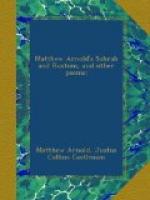“Arnold’s tone is admirably fitted to the peculiar task he had to perform.... In Culture and Anarchy and many successive works, he made his plea for the gospel of ideas with urbanity and playful grace, as befitted the Hellenic spirit, bringing ‘sweetness and light’ into the dark places of British prejudice. Sometimes, as in Literature and Dogma, where he pleads for a more liberal and literary reading of the Bible, his manner is quiet, suave, and gently persuasive. At other times, as in Friendship’s Garland, he shoots the arrows of his sarcasm into the ranks of the Philistines with a delicate raillery and scorn, all the more exasperating to his foes, because it is veiled by a mock humility, and is scrupulously polite.
“Of Arnold’s literary criticism, the most notable single piece is the famous essay On Translating Homer, which deserves careful study for the enlightenment it offers concerning many of the fundamental questions of style. The essays on Wordsworth and on Byron from Essays in Criticism, and that on Emerson, from Discourses in America, furnish good examples of Arnold’s charm of manner and weight of matter in this province.
“The total impression which Arnold makes in his prose may be described as that of a spiritual man-of-the-world. In comparison with Carlyle, Buskin, and Newman, he is worldly. For the romantic passion and mystic vision of these men he substitutes an ideal of balanced cultivation, the ideal of the trained, sympathetic, cosmopolitan gentleman. He marks a return to the conventions of life after the storm and stress of the romantic age. Yet in his own way he also was a prophet and a preacher, striving whole-heartedly to release his countrymen from bondage to mean things, and pointing their gaze to that symmetry and balance of character which has seemed to many noble minds the true goal of human endeavor.”—MOODY AND LOVETT, A History of English Literature.
“As a literary critic, his taste, his temper, his judgment were pretty nearly infallible. He combined a loyal and reasonable submission to literary authority, with a free and even daring use of private judgment. His admiration for the acknowledged masters of human utterance—Homer, Sophocles, Shakespeare, Milton, Goethe—was genuine and enthusiastic, and incomparably better informed than that of some more conventional critics. Yet this cordial submission to recognized authority, this honest loyalty to established reputation, did not blind him to defects; did not seduce him into indiscriminating praise; did not deter him from exposing the tendency to verbiage in Burke and Jeremy Taylor, the excess blankness of much of Wordsworth’s blank verse, the undercurrent of mediocrity in Macaulay, the absurdities of Mr. Ruskin’s etymology. And as in great matters, so in small. Whatever literary production was brought under Matthew Arnold’s notice, his judgment was clear, sympathetic, and independent. He had the readiest appreciation of true excellence, a quick intolerance of turgidity and inflation—of what he called endeavors to render platitude endurable by making it pompous, and lively horror of affectation and unreality.”—Mr. GEORGE RUSSELL.




